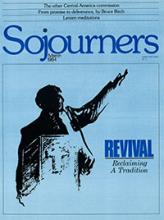My soul is sick and agonized with such a state of things. The position of the Church is one of the greatest wonders of the world;—and yet we are gravely asking, why we do not have revivals of religion? Why has the Spirit of God forsaken us? and many are even glad to have revivals cease, and seem to be disposed to quell every thing down into a state of death-like apathy on every branch of reform ...
Is it possible, my dearly beloved brethren [sic], that we can remain blind to the tendencies of things—to the causes that are operating to produce alienation, division, distrust, to grieve away the Spirit, overthrow revivals, and cover the land with darkness and the shadow of death? Is it not time for us, brethren, to repent, to be candid and search out wherein we have been wrong and publicly and privately confess it ...
Your brother,
C.G. Finney
(Excerpted from Finney's letter, "The Pernicious Attitude of the Church on the Reforms of the Age," in Discovering an Evangelical Heritage, by Donald W. Dayton. Copyright 1976 by Donald W. Dayton. Used with permission from Harper & Row Publishers, Inc.)
Read the Full Article

